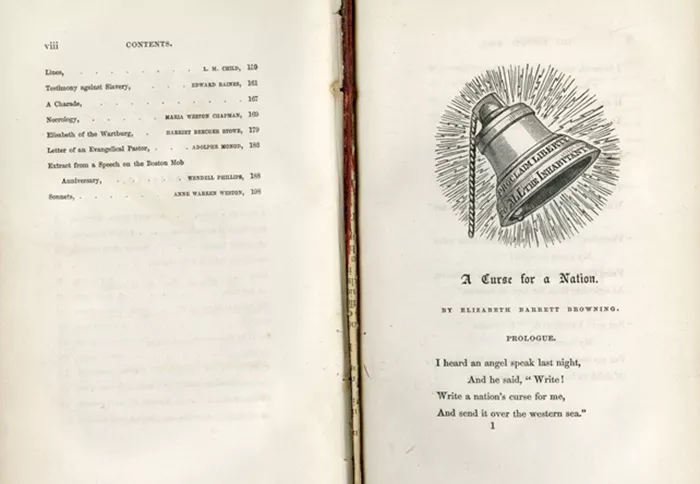Welcome to Poem of the Day – A Curse for a Nation by Elizabeth Barrett Browning
Elizabeth Barrett Browning is one of the most celebrated poets of the Victorian era. She is known for her passionate voice, political activism, and commitment to social justice. One of her most powerful and controversial poems is A Curse for a Nation, written in 1856. This poem stands out for its bold tone, political message, and deep emotional strength.
In today’s article, we will explore the meaning, structure, and message of this poem in clear and simple terms.
A Curse for a Nation Explanation
Background of the Poem
A Curse for a Nation was written during a time of great social and political unrest. Barrett Browning was deeply concerned about issues like slavery, inequality, and the misuse of political power. Originally, this poem was written as part of a campaign against American slavery. However, the poem’s strong words caused such a reaction that Barrett Browning later suggested it also applies to her own country, Britain.
The poem was first published in her 1856 collection Poems Before Congress. It is written in a prophetic voice, using dramatic imagery to express anger at injustice.
Structure and Form
The poem is written in 24 stanzas, each containing four lines (quatrains). The rhyme scheme is regular and follows an ABAB pattern. This gives the poem a steady rhythm, which helps to build the serious and warning tone of the speaker.
Though the lines are not long, they are packed with meaning. Barrett Browning uses vivid images and emotional language to convey her message clearly and forcefully.
Overview and Explanation of the Poem
The poem opens with a speaker asking a powerful question: whether it is right to curse a nation. A spirit answers, saying that a curse is only given where it is deserved. From this point, the poem becomes a kind of divine warning to a nation that has lost its moral direction.
Beginning: The Question of a Curse
In the opening stanzas, the poet introduces a conversation between herself and a heavenly spirit. She hesitates to curse a nation. But the spirit insists: if a nation does evil, it must face judgment.
“Because ye have broken your own chain
With the force of a truth so clear,
That the slave, when he hears it, stands up again
And rejoices in his fear—”
These lines refer to a country that once fought for freedom but now allows others to be enslaved. It is a criticism of hypocrisy—how a nation can claim to be free while still supporting oppression elsewhere.
Middle: The Condemnation
As the poem continues, the spirit delivers the curse. The curse is not a magical punishment, but a moral consequence. The nation that turns its back on justice will suffer from within. Its greatness will fade. Its people will grow cold, selfish, and fearful.
“Because ye prosper in God’s name,
With a lie for your soul’s creed,
And your prayers go up in an idle flame
That is not fire, but weed—”
These lines are aimed at religious hypocrisy. Barrett Browning criticizes the way people use religion to justify wrong actions. She says that prayers mean nothing if they come from a heart that supports cruelty.
End: The Warning
In the final stanzas, the curse becomes a warning. The speaker says that unless the nation changes its ways, it will be destroyed—not by outside forces, but by its own corruption.
“From the last of the land, a thick voice cried,
‘We will bless it in our name!’
But the curse of the Lord fell down and replied,
‘Ye have mocked Me with your shame.’”
This is a powerful conclusion. The nation believes it is doing well and even feels proud. But the curse reveals that its pride is false and its future is in danger.
Themes in the Poem
1. Hypocrisy and Injustice
The central theme is moral hypocrisy. Barrett Browning is angry at nations that claim to be just and holy while allowing evil to continue. She believes that justice and truth should guide both individuals and governments.
2. Divine Judgment
The poem presents a voice of moral authority—almost like a prophet or an angel—who speaks for God. This voice warns that nations will face the results of their actions. Justice cannot be ignored forever.
3. Slavery and Freedom
Although written in a general tone, the poem is deeply connected to the issue of slavery. Barrett Browning strongly supported the abolition of slavery and used her poetry to fight against it.
The Poet’s Message
Elizabeth Barrett Browning’s message is clear: no nation can truly prosper if it supports or allows injustice. She believed that poetry should speak for the oppressed and challenge the powerful. A Curse for a Nation is not just a poem—it is a moral call to action.
The curse she speaks of is not just words—it is the slow decay of a nation that chooses pride over truth, wealth over mercy, and silence over justice.
Reception and Legacy
When the poem was first published, it caused much debate. Some readers were angry, thinking Barrett Browning had cursed their country. Others praised her for her bravery and moral clarity.
Today, the poem is seen as a bold example of political poetry. It reminds us that literature can speak truth to power and that poets can be powerful voices for change.
Conclusion
A Curse for a Nation by Elizabeth Barrett Browning remains a powerful piece of poetry. It shows how literature can take a stand against injustice. The poem’s message is timeless: nations must stay true to justice and mercy, or they will face the consequences of their choices.
Through strong, clear language and bold imagery, Barrett Browning delivers a warning that still speaks to us today. Her poem reminds us that silence in the face of wrong is itself a form of guilt—and that justice, though delayed, always finds a voice.


